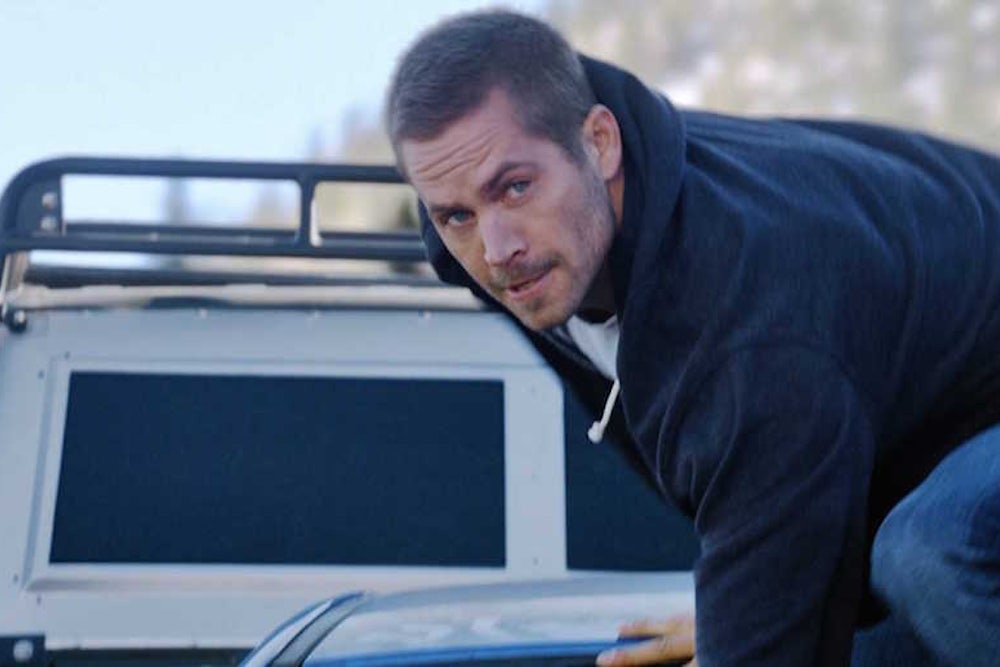I saw Gone with the Wind when I was three, grew up on Garbo, and make all my love interests study Hiroshima mon amour. But for all that high-mindedness, nothing gets my blood pumping like The Fast and the Furious franchise. In the latest installation, Furious 7, The Rock breaks an arm cast by flexing his bicep, and I felt my heart shudder and swell and splinter along with it.
It’s been 14 years since the first movie in the franchise thundered to life—before the first Lord of the Rings movie, before the Harry Potter franchise, long before Marvel’s cinematic universe was a lucrative twinkle in Disney’s eye. Characters have come and gone, and the series has transformed from a relatively low-budget speed-freak-fest to a globetrotting, star-studded box office behemoth. But while the Furious movies are undoubtedly part of Hollywood’s franchise addiction, they also defy the conventions of today’s Hollywood landscape. Maybe it’s because they started before franchises really took off, or maybe it’s just the diesel fumes, but Furious is, in a way, the anti-franchise franchise.
As every Marvel announcement or Star Wars trailer release shows, Hollywood has become defined not by fulfillment, but by anticipation. As Mark Harris put it at Grantland, “What the movie industry is about, in 2014, is creating a sense of anticipation in its target audience that is so heightened, so nurtured, and so constant that moviegoers are effectively distracted from how infrequently their expectations are actually satisfied. Movies are no longer about the thing; they’re about the next thing.” Fans come for the post-credits sequence as much as they do for the actual movie, and trailer releases are now major motion-picture events.
Franchise it may be, but The Fast and the Furious doesn’t care about all of that. Furious 7 picks up where Six left off, and also ties together loose ends from the third installment. After defeating the previous super-villain, Dominic Toretto (Vin Diesel) and Brian O’Connor (Paul Walker) are back in Los Angeles as free men. But the bliss is short-lived, thanks to one Deckard Shaw (Jason Statham), hell-bent on avenging his brother. But the plot details are largely irrelevant in what is an unnecessarily complicated plot. What matters here are the thrills: Cars are driven off airplanes, a drone attacks the streets of Los Angeles, and Paul Walker leaps off a bus as it's falling off a cliff. In classic Furious spirit, just when you think it can’t get more ridiculous, it does. It’s all about instant gratification, the thrill of the chase and the exhilaration of speed. It doesn’t all have to make sense, or even conform to the laws of gravity; it’s just 134 minutes of pure adrenaline.
No one cares what’s going to happen in the next movie because they’re too caught up in what’s happening now—and besides, it doesn’t matter. Because what keeps the Furious movies together isn’t the plot, or even the characters (Tokyo Drift, the franchise’s third installment, had neither Vin Diesel nor Paul Walker). It’s a sense of camaraderie, the belief that friendship and a shared love of engines and wheels can mold people from all over the world into a family, reflected not just in Diesel’s many pronouncements about family, but also in the franchise’s cosmopolitan ethos. It’s a lovely idea, laughable perhaps, but appealing enough to have kept seven movies smashing through the box office every two years or so.
And that’s part of why Furious 7, for all its liberating thrills, is so painful. The movie is clouded by the knowledge that one of its stars, Paul Walker, did not live to see the movie finished. Instead, director James Wan was left to piece together the rest of the film using Walker’s brothers, another actor, and liberal amounts of CGI. That technology can now reanimate dead actors has rightfully received a lot of attention, but what deserves even more applause is how the filmmakers dealt with Walker’s death on screen. For a franchise known for cheesy, heavy-handed lines, Furious 7 served up a classy, heartbreaking send-off for its departed star, one that acknowledged the tragedy of real life without letting it overwhelm the fictional world. Walker will be deeply missed, and Fast & Furious 8 won't be the same without him. Good thing Helen Mirren’s already stepped up to the plate.
